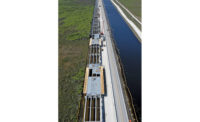Outraged by rising water pollution in their state, Florida environmental groups are pushing to make protection of the state’s water resources a priority in the 2014 legislative session, which begins on March 4.
In the past year alone, record numbers of dolphins, manatees and pelicans have died in the Indian River Lagoon. Investigations placed the blame on pollution from a 146% artificial expansion of the lagoon’s watershed and rapid coastal development.
In the same period, heavy rains have increased the water level in Lake Okeechobee, forcing the U.S. Army Corps of Engineers to release several flows into the St. Lucie and Caloosahatchee rivers.
The polluted water has caused large algae blooms in the estuaries of both rivers, resulting in severe environmental damage.
Rallies were held in 16 cities throughout the waterlogged state in late January to launch the Floridians’ Clean Water Declaration Campaign, an effort to gather 100,000 signatures to support the online Clean Water Declaration.
The principal goals of the declaration are “to stop pollution at its source and to promote water conservation,” says Lisa Rinaman, St. Johns Riverkeeper, Jacksonville.
As the environmental groups rallied, Gov. Rick Scott (R) announced his 2014 budget would include $55 million in funding for water quantity and quality protection for Florida springs, including reduction of nutrient impacts and alternative water-supply development.
Environmentalists say the program does not target the root problem. “We’re using water faster than it can be replenished,” says Rinaman. “We’re not living within our means.” Instead of the alternative supplies and water treatment in Scott’s program, she would prefer to see efforts concentrated on reducing wasteful irrigation and fertilizer use and upgrading leaking septic systems.
Since 2011, when Scott took office, Florida has adopted nine Basin Management Action Plans (BMAP) to restore waters by reducing pollutant loadings, says Patrick Gillespie, press secretary for the Dept. of Environmental Protection. “That’s been our focus, to restore water bodies.”
But environmentalists are not satisfied with that strategy. BMAPs “don’t have any teeth in them,” says Drew Martin, a Sierra Club leader. They are “mostly voluntary,” he says.
Several measures to improve water quality are in bills currently scheduled to be filed when the Legislature resumes its work on March 4, says David Cullen, Sierra Club lobbyist.
One bill would make mandatory the best management practices for agricultural producers. Another bill would require septic systems to be connected to the central sewer or upgraded at no cost to the property owner.
A third bill proposes to require wastewater-treatment facilities to achieve the standards for advanced water treatment, and a fourth bill proposes to require, as a minimum, all local authorities to adopt a model ordinance for residential fertilizer use.




